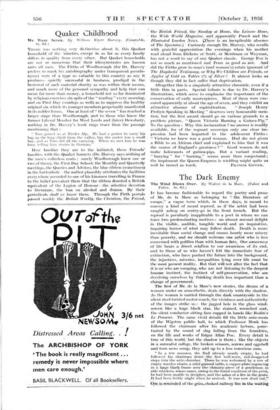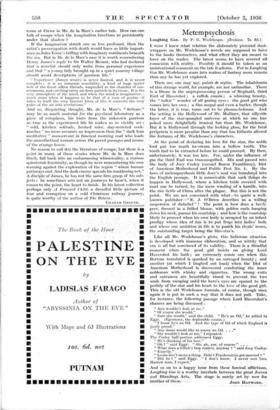The Dark Enemy IT has become fashionable to regard the
poetry and prose ' of Mr, de la Mare as belonging to t.` the literature of escape," a vague term which, in these days, is meant to
convey a kind of moral reproof, as if the artist had been caught asleep on sentry-go in the front trench. But the reproof is peculiarly inapplicable to a poet in whom we can trace two predominating motives : an almost sensual delight in the visible, audible, tangible world and an inquisitive, inquiring horror of what may follow death. Death is more inevitable than social change and causes hourly more misery
than poverty, -and we" should welcome one artist who is less concerned with politics than with humah fate. Our 'awareness of life bears a direct relaTion to • our awareness of its end, and to those of us who haven't felt • the immediate fear of extinction, who have pushed the future into the background, the injustices, miseries, inequalities lying over life -must be the most present reality. But that will not alter the fact that it is iee'who areescaping, who are not listening to the deepest htunan instinct, the instinct of self-preservation, who are deceiving ourselves_ by thinking death less important than a change of government The first of Mr. de la Mare's new stories, the -dream of a woman under an anaesthetic, deals directly with the shaddw. As the woman is carried through.the dark countrySide in the silent steel-twisted motor-coach, the vividness and authenticity
of the images strike us : the jagged hole in the glass wind- . screen like a huge black star, the stained, wrenched seat, the silent conductor sitting face cupped in hands like Rodin's
Le Penseur. The same vivid details fill the little ante-room of the Wigston public hall, to which Professor Monk has followed the chairman after his academic lecture, punc-
tuated by the sound of slag falling from the foundries, on the life and works of Edgar Allan Poe Every detail is
'trite of this world, but the shadow is there ; like the objects in a surrealist collage, the broken scissors, screws and eggshell and torn news scrap; they add up to a less conscious sum.
" In a few minutes, the Hall' already nearly empty, -he had followed his chairman desinOthe fivd well-worn," red-druggeted steps into the ante-chamber. There he-was weleathed by a row of empty wooden ehaiis,a, solidsgattined table,- a copper-plate engraving in a large Week: franie over 'the- chimney-piece 'of a .geritleman side-whiskers,-whose name, owing to the foxed condition of the print, he had been unable to decipher, and the ashes of afire in the grate. 'It had been feebly alight when he arrived. It was now dead out:" is TrinjIlded of the grim, choked. railway: ire in the waiting
room at Crewe in Mr. de la Mare's earlier tale. How can one- talk of escape when the imagination functions so persistently under that shadow ?
If the imagination struck one as less profound, then t the
artist's preoccupation with death would have as little import- ance as Jules Verne's trifling with imaginary continents beneath the sea. But in Mr. de la Mare's case it is worth remembering Henry James's reply to Sir Walter Besant, who had declared that a novelist should only write from personal experience and that " a young lady brought up in a quiet country village should avoid descriptions of garrison life."
" Experience (James wrote) is never limited, and it is never complete ; it is an immense sensibility, a kind of huge spider web of the finest silken threads, suspended in the chamber of con- sciousness, and catching every air-born particle in its tissue. It is the very atmospherd of the mind, and when the mind is imakinative- much more when it happens to be that of a man of genius—it takes to itself the very faintest hints of life, it converts the very pulse of the air into revelations."
And so, disquieting thought, Mr. de la Mare's " fictions!' may be as much material for the psychical laboratory as a piece of ectoplasm, his hints from the unknown garrison as true as the experienced life he makes us so vividly see : " cold, kitchen solitude, hushed mice, day-secreted cock- roaches " no more accurate an impression than the " dark lean meditative " manservant in funereal morning coat who leads the anaesthetised woman across the paved passagei and rooms of the strange house.
No reason to call this the literature of escape, but there is a
point in many of these stories where Mr. de la Mare does flinch, fall back into an embarrassing whimsicality, a curious spinsterish femininity, as though he were remembering his own warning against the exploration of the region " where human pathways end. And the dark enemy spreads his maddening net."
A disciple of James, he has not the same firm grasp of his sub- jects : he sometimes sets out on journeys he hasn't, when it conies to the point, the heart to finish. In his latest collection
perhaps only A Froward Child, a dreadful little picture of fear and corruption on a cold Christmas railway journey, is quite worthy of the author of The Return.
GRAHAM GREENE.











































 Previous page
Previous page